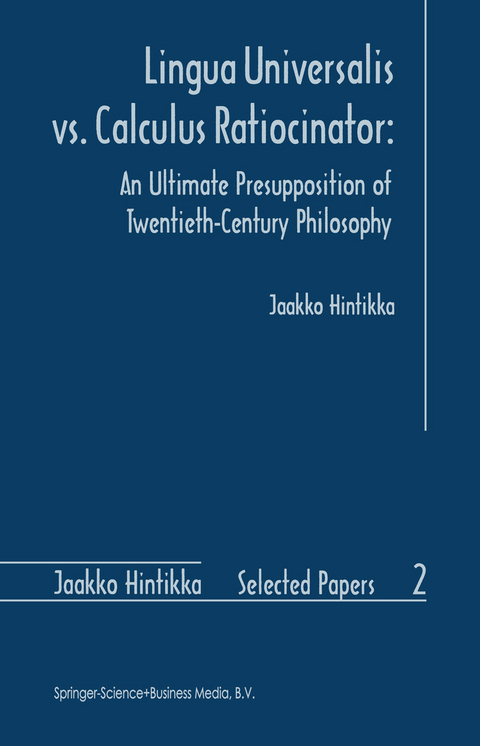
Lingua Universalis vs. Calculus Ratiocinator:
Springer (Verlag)
978-90-481-4754-0 (ISBN)
Jaakko Hintikka is the author or co-author of thirty volumes and of some 300 scholarly articles in mathematical and philosophical logic, epistemology, language theory, philosophy of science, history of ideas and history of philosophy, including Aristotle, Descartes, Leibniz, Kant, Peirce, The Bloomsbury Group, Husserl and Wittgenstein. He has also been active in international scholarly organizations, most recently as the First Vice-President of FISP, Vice-President of IIP and Co-Chair of the American Organizing Committee of the Twentieth World Congress of Philosophy. He has been Editor-in-Chief of the International Journal Synthese and the Managing Editor of Synthese Library since 1965.
1. “Contemporary Philosophy and the Problem of Truth”.- 2. “Is Truth Ineffable?”.- 3. “Defining Truth, the Whole Truth and Nothing But the Truth”.- 4. “On the Development of the Model-Theoretic Viewpoint in Logical Theory”.- 5. “The Place of C.S. Peirce in the History of Logical Theory”.- 6. (with Merrill B. Hintikka) “Wittgenstein and Language as the Universal Medium”.- 7. “Carnap’s Work in the Foundations of Logic and Mathematics in a Historical Perspective”.- 8. “Quine as a Member of the Tradition of the Universality of Language”.- Appendixes.- 1. Jean van Heijenoort, “Logic as Calculus and Logic as Language”.- 2. Martin Kusch, “Husserl and Heidegger on Meaning”.
| Erscheint lt. Verlag | 7.12.2010 |
|---|---|
| Reihe/Serie | Jaakko Hintikka Selected Papers ; 2 |
| Zusatzinfo | XXII, 270 p. |
| Verlagsort | Dordrecht |
| Sprache | englisch |
| Maße | 160 x 240 mm |
| Themenwelt | Geisteswissenschaften ► Philosophie ► Erkenntnistheorie / Wissenschaftstheorie |
| Geisteswissenschaften ► Philosophie ► Geschichte der Philosophie | |
| Geisteswissenschaften ► Philosophie ► Logik | |
| Geisteswissenschaften ► Philosophie ► Philosophie der Neuzeit | |
| Geisteswissenschaften ► Philosophie ► Sprachphilosophie | |
| Geisteswissenschaften ► Sprach- / Literaturwissenschaft ► Sprachwissenschaft | |
| Sozialwissenschaften | |
| ISBN-10 | 90-481-4754-9 / 9048147549 |
| ISBN-13 | 978-90-481-4754-0 / 9789048147540 |
| Zustand | Neuware |
| Haben Sie eine Frage zum Produkt? |
aus dem Bereich


